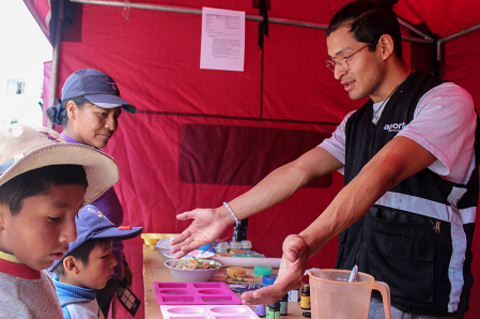SBC In WASH Using Community Engagement & ECD Programs

Summary:
Washing hands with soap at critical moments reduces diarrhea incidence by half, yet handwashing among caregivers in Peru remains dismally low, with only 1 in 5 washing their hands after using the bathroom and lower rates before eating or feeding a child. Building and sustaining the habit of handwashing has proven particularly challenging, even when program designers successfully change knowledge and attitudes. A collaboration between social impact lab Aporta and behavioral design firm ideas42 used insights from the behavioral sciences to identify barriers contributing to this intractable challenge and to design new solutions to encourage handwashing by caregivers of small children. A design process combining expertise in behavioral science and innovation within the local context led to a robust, feasible solution set. Recognizing that knowledge and intentions alone are insufficient to build handwashing habits, we designed a multi-component community engagement intervention targeting a range of behavioral barriers that holds promise for generating lasting behavior change. The intervention package combines a family fair with handwashing badges, pledges, and in-home reminders. It leverages the power of disgust, public commitments, and the Ikea effect, among other behavior-change tools, to create a moment to reflect on handwashing behavior, reshape views of what it means to be a person who washes (or doesn't wash) one's hands, and provide ongoing cues to keep handwashing top of mind.
Background/Objectives
Washing hands with soap at critical moments reduces diarrhea incidence by half, yet handwashing among caregivers in Peru remains dismally low, with only 1 in 5 washing their hands after using the bathroom and lower rates before eating or feeding a child. Building and sustaining the habit of handwashing has proven particularly challenging, even when program designers successfully change knowledge and attitudes. Working with the social impact lab Aporta, we used insights from the behavioral sciences to identify barriers contributing to this intractable challenge and to design new solutions to encourage handwashing by caregivers of small children in Puno, Peru.
Description Of Intervention And/or Methods/Design
Through formative qualitative investigation, we identified a range of behavioral barriers to handwashing. The intervention package addressing these barriers centers on a family fair held in town plazas with skits, soap-making activities, and games. The fair aims to establish a new norm that not washing hands is socially unacceptable, highlight the many health and social consequences of not washing hands, and make handwashing feel like a more enjoyable experience. Activities trigger a sensation of disgust at the idea of unclean hands, a powerful tool for changing behavior. A special, handmade soap that participants take home from the event as well as reminder stickers posted in the home during community health worker visits keep handwashing top-of-mind. Public commitment badges and signs in health centers and local businesses reinforce the ubiquity of handwashing and draw a connection between handwashing and success in the community.
Results/Lessons Learned
The intervention package was developed through a collaborative process including behavioral scientists from ideas42 and Aporta's Peru-based social innovation team, with an explicit focus on building behavioral design capacity within Aporta. The collaboration led to solutions reflecting deep understanding of the relevant cognitive biases and how they manifest within the local context. Solutions evolved through extensive field-based co-creation and user testing, which identified solutions with greatest potential for impact, refined designs, and created opportunities for increased engagement with the intervention. Results from user testing suggest that the intervention package is feasible and acceptable to community members and that it addresses the behavioral barriers identified in the formative work. The solutions are currently being piloted in six communities in Puno to evaluate impact, with results expected in 2020. Aporta has also begun to apply lessons from this collaborative process to use behavioral insights to tackle other WASH challenges.
Discussion/Implications For The Field
A collaborative design process combining expertise in both behavioral science and innovation within the local context led to a robust, feasible solution set. Recognizing that knowledge and intentions are insufficient to build handwashing habits, we designed a multi-component community engagement intervention targeting a range of behavioral barriers with promise to generate lasting behavior change. Solutions are most likely to be effective when they create a moment to reflect on handwashing behavior, reshape views of what it means to be a person who washes (or doesn't wash) one's hands, and provide ongoing cues to keep handwashing top of mind.
Abstract submitted by:
Jana Smith - ideas42
Emily Zimmerman - ideas42
Nicole Cohen - ideas42
Rosii Floreak - ideas42
Jamie McTavish-Perez - Aporta Breca Impacto Social
Sara Sarfaty Vargas - Aporta Breca Impacto Social
Approved abstract for the postponed 2020 SBCC Summit in Marrakech, Morocco. Provided by the International Steering Committee for the Summit. Image credit: ideas42
